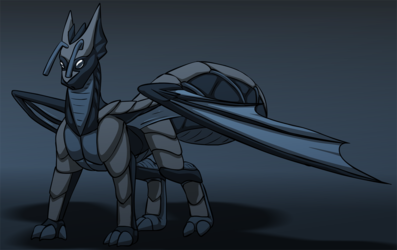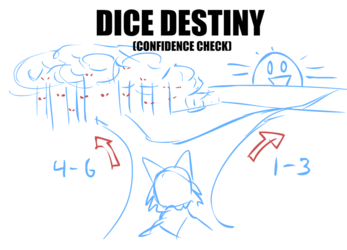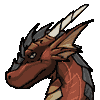Sign In
CloseDice Checks
Plot and Map Structure
Player Creation
INTRODUCTION
Welcome to the Comic RPG handbook. What will be presented to you is a series of concepts, ideas, and systems designed to integrate an RPG system with drawing a comic.
This handbook is directed towards artists who wish to create a comic book narrative, but wish to include other people's original characters into the plot. However the concepts within can be utilized for writing a comic book narrative as well without the need of using dice or a random number generator.
The general problem when utilizing other people's characters into a narrative is that they are not your own character, so you'll never be able to figure out on your own how that character would behave, or their capabilities in a combat situation. Typically for most people, they would always set their character to be 'unbeatable' which simply might not work depending on the narrative and world you're trying to build. Especially if other people's characters are being used as a sort of 'test' to display concepts and your own character's strengths and weakness that you are pitting against other people. Relative powers might be different from character to character as well, which makes the integration of many characters all the more challenging.
As such I've created a "Pen & Paper" RPG system that can act as a soft or hard guide to how events may unfold depending on the narrative you wish to create.
INITIAL CONSIDERATIONS
Before getting started on your comic, you have to decide the overall format. Is it character-focused or is it environmentally focused? Is it intended to highlight your own character, with other people's characters acting as the supporting cast or an opposing force? Is it a playground, for other players to run around inside a world of your own creation? And if so is it a scenario that's intended to be lost, won, or simply explored?
How long do you want this comic to run? If you have many ideas you want to explore the length obviously increases, but if you only have the time and patience for something short you'll have to condense what is drawn and presented.
How many characters do you wish to involve? Depending on your skill and ambition you might want to involve a lot of people, or only a couple. How much focus and attention will these characters get, and are they going to be featured prominently or just going to be there as background filler now and then?
LIMITATIONS
Keep well in mind this system is about the comic first and RPG elements second; there's no point for this to be a full blown pen and paper game because many of those already exist with rules tailored for that kind of experience. Stories and images can be inspired by pen and paper games, but to draw a whole comic based off a gaming session would likely span hundreds of pages and would be prohibitively time-consuming.
SIMPLIFICATION
The main idea behind this system is that any reader at a glance can recognize a number higher than another and then create the logic in their heads that this is reflected in what the comic displays. There are no in-depth mechanics that people need to be aware of to know how the game is being affected.
GAME TYPES
"DUNGEON MASTER"
This format is with consideration to writing a comic as if it was being played out as a proper pen and paper RPG. You only have a general narrative in mind, but no clear details. The details will be mostly determined by the rolls of the dice, and the story will grow from those rolls. This is also the main format that this handbook will be built around.
You as the artist will not be providing a central character to the narrative; that will be provided by the players themselves. A leader might be provided beforehand or it might be something that is decided on your end, or it may even just be a single person playing in your narrative. The ultimate 'goal' under this format is for the players to explore a 'dungeon' and see how far they progress. There can be obstacles put in the way such as potential problems to be solved, riddles, fights, and an ultimate goal to be reached that's maybe treasure or some other objective. As with pen and paper RPGs you as the game master gets to decide how 'beatable' your scenario is.
Additionally it's a good idea for the dice rolls to be displayed so that the people watching will feel like they too are following the experience of a comic being written by the dice throws.
"STORYTELLING"
This format is used if you as the artist have a firm narrative in mind, and know exactly how major events should happen. This is typically when you have a central character of your own to present, and outside players are there for your own to play off of. The dice rolls here would typically determine behaviors of characters interacting with your own, either in conversation, friendships, rivalries, or combat.
Dice rolls would most likely be hidden under this format; their influence on events would be subtle, as the overall reach of the comic would not be changed by dice rolls. Though of course they could be included for flavor, if desired.
"TOURNAMENT"
This is a player vs. player format where you wish to create an environment in which players pit their characters against each other. You may very well insert your own character as an opponent or a 'final combatant' but be clear about your intentions if you do involve yourself as a player that you will player your character fairly, or alternately that your character will be presented as an unfair fight or simply unbeatable.
A series of dice rolls might be presented in this format, depending on how many panels of combat are displayed. Or a dice roll for each 'panel' if desired.
DICE MECHANICS AND RULES
The overall idea of a Comic RPG is to keep things relatively simple. It is still a comic in the end and things should be displayed visually with the art as opposed to a series of numbers determining the outcome. As such the idea is to be able to create a powerful yet very simplistic system. I've designed this system to be used with a six-sided die, but the concepts could easily be applied to a coin toss, or any sized dice.
In events of tied scores you should decide in advance of the comic whether you as the game master or the player wins a tie, or if having a tie simply 'delays' an outcome to a later page or panel.
Do only one dice roll per character per panel maximum. There should never be an instance in where you have to make multiple dice rolls for a single character to determine the outcome of a panel.
DICE OUTCOME AND DRAWING EFFECTS
The difference between a dice roll and an opposing dice roll or check will determine what you end up drawing. If the difference is 0-1 then it was a close matchup; so if the roll was for avoiding a trap, it might mean they narrowly escaped or narrowly got caught, while if the difference was 6, then the person would have either avoided the trap completely without triggering it, or been hit with the full force of the trap.
Outcomes such as this can be substituted with a coin flip since one side will determine a 'pass' or a 'fail' and then you as the artist can decide the effects of the flip.
Passive choices can be made with a dice roll as well, as rolling one of a set of numbers or another may have a player go left or right if there's a fork in the road; where one path leads to danger and another leads to safety.
In the case of multiple character rolls, the one that makes the most impressive or interesting roll may end up being the character that takes the foreground or focus of the panel being drawn.
In terms of conversations the closeness of the rolls can also display how much people accept or reject the idea in the conversation or mood; for example, a roll to see if a person becomes extremely irritated or outright offended. It can also be determined to see who takes a more commanding lead or take initiatives in relationships.
CHARACTER STATISTICS
The following system was designe
Submission Information
- Views:
- 1317
- Comments:
- 0
- Favorites:
- 1
- Rating:
- General
- Category:
- Visual / Other




